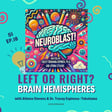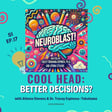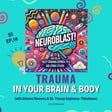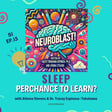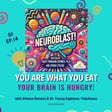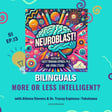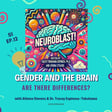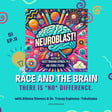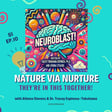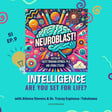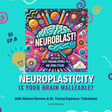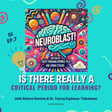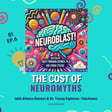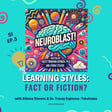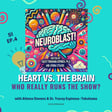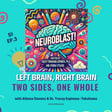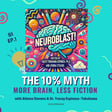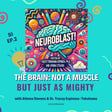Become a Creator today!Start creating today - Share your story with the world!
Start for free
00:00:00
00:00:01

AI is Ruining Everything
In this episode of Neuroblast! Dr. Tracey and Athena discuss the impacts of AI on our brains, brain health, jobs and the workplace, and if we're really at risk of being taken over by bots. Tink your brain is just like a computer? Think again!
Original music by: Julian Starr
Transcript
Introduction and Background
00:00:00
Speaker
Hello brains, young and old. Welcome to NeuroBlast, the podcast where we keep your neurons firing.
00:00:24
Speaker
I am your host, A thena Stevens, student at the Harvard Extension School. And I used to be an actor and a writer as well as a creative entrepreneur, but it turns out today I am out of a job
AI's Impact on Jobs
00:00:43
Speaker
Because today we are talking about AI and we didn't know how to write a script, so we asked AI to write it for us. Tracy, introduce - yourself before AI takes over your job too.
00:01:00
Speaker
Well, I am Tracy Tokuhama-Espinosa. I'm an instructor at the Harvard University Extension School and the Summer School, and I'm an international educational consultant. And Athena, don't be worried about your job being taken over.
Human Skills vs. AI Efficiency
00:01:16
Speaker
We'll have to talk a bit about all the things that humans learn.
00:01:19
Speaker
We think about it as being knowledge and skills and attitudes. There's some things that AI is definitely faster and more efficient and all the rest of it. But there's other things that humans do for humans
00:01:31
Speaker
that is unique to humans so far. So definitely we have to talk about all of those different points there, but I'm not afraid of technology. I think we have to embrace it. It's not going away, but it will change a lot of things that happen.
AI in Education
00:01:47
Speaker
It's not going to change this podcast, for example, because people talking to people is a very, very intimate and very personalized thing that I think changes ah you know the way you approach new information, but it may change content of things so yeah let's keep our minds open. So the idea of this is guys it wasn't until I did Tracey's class last summer which by the way all of you can still sign up for um I think or else I will edit this out um at the Harvard Extension School it wasn't until last summer in Tracey's
00:02:24
Speaker
classroom that I learned how - - to dance with the devil that was AI, so this is about a tool, how to use it wisely, how not to use it, what it can create, what it can destroy.
00:02:41
Speaker
But let's start here. Part of what, as I understand it, makes AI unique is
00:02:52
Speaker
connected to what we were talking about last week in terms of connectomes . And this is not simply if then computer programming.
00:03:05
Speaker
Is that right? That's getting
AI's Data Limitations
00:03:08
Speaker
closer. Yeah, and that's that's a big part of this idea. This is why it's so, it's almost ironic that you call artificial intelligence neural networks.
00:03:16
Speaker
I find that very funny because there's no neurons in that machine. But the idea is based off of human learning. How humans actually learn - was the inspiration for artificial intelligence. - But artificial intelligence, or for example, take the ChatGPT app that we were talking about,
00:03:34
Speaker
It takes, it gathers everything, everything that's been uploaded in the internet, good or bad, high quality, low quality. And when you ask a question in the most appropriate way possible, the most direct way possible, with the most targeted audience in mind and all the rest of that, you can get some amazing answers because it can call from everything that's on the internet, which is absolutely fascinating.
00:03:59
Speaker
However, it doesn't do very well on your personal experiences. Like for example, you know, in our class, I asked, what do you want to know and why? Well, you can't ask ChatGPT that. It's not going to give you a very, ah very clear answer because there's just way too many things that are involved there. And so when we say the neural networks in the brain are are formulated basically by your prior experiences, what you have known in your life and how you connect things,
00:04:25
Speaker
Whereas neural networks and artificial intelligence are based on everything that's out there, all that information on the internet. And so this is why um in our class, for example, I would encourage you to use ChatGPT as a sparring partner or to build up certain vocabulary or to clarify definition of terms or to look for key search words in a research process.
00:04:45
Speaker
Never, never, never use it to write because writing is the highest form of thinking. And if you are using ChatGPT think for you, then you're really pulling out the scaffolding from under your own fundamental networks of how you are learning about the world. And so there's things you can do with it. There's things you shouldn't do with it.
00:05:07
Speaker
And also just to add to that from a bias point of view, given that it is learning from everything on the internet, and we know that the internet is biased in many ways to certain genders, certain ethnicities, all that.
Bias and Ethics in AI
00:05:27
Speaker
It is pulling out of those biases as well. So there is a great book called Code Dependent: Living in the Shadow of AI that is about how AI is perpetuating these gender stereotypes and biases because it is that is - all it knows and that is all it can pull from.
00:05:54
Speaker
So not only is it potentially pulling out the scaff olding - to think, it is also pulling or pouring in the biases that we are working so hard to counteract.
00:06:13
Speaker
Absolutely. And I think there was a great example. We did a training at Harvard with some of the teachers about um potential uses and also pitfalls of of of AI. And one of the things they pointed out is, for example, um let's recognize a hand. OK, what does a hand look like? And you know she showed a bunch of real human hands and all the rest of that.
00:06:35
Speaker
If you ask for a generation of what a human hand looks like and you take the average of all the images that have ever been uploaded of hands, what you end up with is this average, right?
00:06:50
Speaker
Which looks nothing like a hand. It usually has very distorted fingers and sometimes it only has four and sometimes it has six fingers or whatever. And they're all white because there's very few images of non-white hands. And so you get um an average of what exists, as you're saying, right? And so that means that you're definitely prone to a whole lot of other biases about information.
00:07:11
Speaker
We also know that ChatGPT in trying to become more intelligent kind of makes stuff up sometimes, which is kind of crazy. Yeah, that's the biggest one. Oh, yeah. yeah So - check the sources.
00:07:24
Speaker
I've had students who said they cite and I'll put it as feedback, "you know, this is a great idea, but you need to give offer evidence. What is the source you have for this?" And they'll take their statement or their sentence and they'll plug it in and ChatGPT will spit out a great source. And it looks good because, yeah, well, I recognize that author. He is an expert in this field.
00:07:45
Speaker
But it's strange. I've never read that paper. And you go to look and the paper doesn't even exist. Right? And so it makes stuff up. - And we've got to be very, very careful um ah taking it at face value. And why should why are you citing something you haven't read anyways? I mean, had that person taken the time to see if that was even a good source, they would have found the same thing I found out. Right? So.
00:08:06
Speaker
And it's a dangerous tool in the sense that people get lazy.
AI's Role in Academic Research
00:08:10
Speaker
It's fast. Um, the students who I have caught using it because they're are forbidden, they're they're encouraged to use it as a sparring partner and forbidden to use it as a writing partner.
00:08:20
Speaker
Um, but those who have, and I confronted them, I said, I'm sorry, this does not look like your work. This looks like it was generated by AI. And they usually do these full confessions and throw themselves on my feet. And they say, yeah, I just got, I panicked. I just ran out of time and I did... So they--
00:08:35
Speaker
The reasons people go to it as a tool are just sort of this standby, get me out of a jam thing without realizing what they're doing to themselves and their own learning process. And so um have a good think about it. There are many things that we should automate. I agree. AI is great for those things. And we can now all do higher order things because we don't have to do these lower level things.
00:08:59
Speaker
However, there are there is such a thing as this fundamental scaffolding of neural trajectories in the brain. They go from higher order things, from lower order concepts to higher order concepts. And if you don't have basic core notions in place, you can't go to higher order understandings. And so that scaffolding is built up in part through you know deeper thinking processes, which are facilitated by writing, for example. And if you're skipping that process, you're skipping out on your thinking.
00:09:30
Speaker
So it's funny because I feel like Chat GPT and AI is something that academics can - be quite puritanical about in terms of don't use it, don't even pretend it's there, don't look at it, no.
00:09:50
Speaker
Um, and yet I know that there are times where I'm going, I wonder if
00:09:59
Speaker
The lentiform nucleus in the basal ganglia when damaged will that affect the ability to feel anger?
00:10:10
Speaker
Because that lentiform nucleus is found to be part of the hate circuit and is activated when you feel contempt and on and on and on.
00:10:22
Speaker
Um, but I don't know who to talk to about that. I don't really have the vocab beyond - - that.
00:10:34
Speaker
And so very often, my starting point is going to Chat GPT with this wild idea and going, is this crazy?
00:10:45
Speaker
Or is it plausible? And then from there, I get vocab, go to the Harvard Library web page - start reading and all that.
00:10:57
Speaker
I would say that is a tool take this crazy idea that I've come up with at 3 a.m. and start learning.
00:11:09
Speaker
So what is the good uses of Chat GPT? Is an AI. It's here to stay. What do we do?
00:11:20
Speaker
How do we use it wisely? Well, I think you just tapped into a great example there. For, one of the best things that we can do, one of the worst things we can do is ask, you know,
00:11:34
Speaker
the the kind of what if questions without also using our own brains and thinking about, okay, I'm guessing that this ties into this particular emotional network.
00:11:46
Speaker
And what you can ask then is very, you know much more sophisticated question of ChatGPT is "what evidence is there for whatever is your hypothesis your personal hypothesis". So ask it push yourself to do that thinking first and then test your best hypothesis or test you know what it is that you think there's got to be something out there about X or whatever it is. And so and then try to look up and try to say you know who...
00:12:17
Speaker
are the researchers in this field, and then see what they have actually said. Now, one thing that is a good use of ChatGPT, because we all get overwhelmed by trying to look at evidence, and we see the the bad repercussions of this as people stop reading, and they only want to hear very brief summations of things.
AI in Foundational Learning
00:12:35
Speaker
Well, one thing that ChatGPT does actually pretty well is if you give it a very complex article, and you say, what are the 10 most important highlights here, or is there any evidence in this article for this hypothesis or something like that?
00:12:51
Speaker
It skims the article super fast and that can sort of leapfrog your research in that sense. So, but learning to use it in a much more sophisticated way than just saying, give me the answer.
00:13:02
Speaker
This is why one of the best uses of Chat GPT right now, um which I just admire Sal Khan for, he has devised something called Khan Migo. And Khan Migo uses ChatGPT with one incredible caveat. He teaches, so kids and and teachers can use this.
00:13:20
Speaker
So if a kid says, what is one plus one is two, what is, you know, tell me the answer, you know, what happened or give me, give me the answer. The way that Khan Migo works is it gets the answer, but doesn't give it to It creates a Socratic question that helps you reach the answer yourself.
00:13:40
Speaker
Wow. Brilliant. Brilliant. The only thing they've done is put a stop gate on just spitting out the answer and now turn that - into a Socratic question. Yeah. And that is, that is brilliant. Now that helps you elevate the levels of thinking. And so those kinds of tools, that's kind of the gold star standard ah you know all two years that this has been out of there.
00:14:02
Speaker
That's probably one of the best uses of ChatGPT is teaching kids how to think more deeply and broadly about their own premises, use that right vocabulary to formulate better and more sophisticated questions, and then sort of leap frog that thinking process, help you think through those things so that you yourself are strengthening your own foundational knowledge of the information.
00:14:26
Speaker
That's a good way to use it. So it sounds like in a lot of ways it boils down to, do you want to learn or do you want it to do your work for you?
00:14:39
Speaker
Unfortunately, yes. And unfortunately, the answer to a lot of kids' questions is, " this is such a boring assignment in school, I'm just going have ChatGPT it", and then teachers have no recourse. There's no really good way to figure out um whether or not this was generated by ChatGPT.
00:14:57
Speaker
Now, they are embedding signatures, which is kind of crazy, into the answers so that you can actually see now, but it takes a lot of effort and energy on the teacher's part to sort of do that policing.
00:15:08
Speaker
So on my end of the day, I think that the the best thing that we can do - from a teaching perspective is sort of explain to people what's going on and not not tell them it's a choice between thinking or not thinking
00:15:21
Speaker
But it's actually explaining that those biases exist, that we have to be - sophisticated in our use of it, that they should not be using this as, you know, write me an essay on.
00:15:32
Speaker
But that whole point of learning to write and to think through your own writing is highest form of thinking, really. And so getting yourself to push, push yourself to learning how to write is a key part of embracing this idea that if you really want to grow as a human being, you have to really embrace these complexities.
00:15:51
Speaker
Now, the shortcut tools, I agree. If it's something that helps us get in and out of the supermarkets faster because AI can read, can scan everything we've just put in our bag and we just walk out, great. You know - there's some things that are are advancing in a way that are very different, but things that have to do with human cognition and what's happening to human thinking as a result.
00:16:12
Speaker
So I had a student last year who did her paper on what would be the impact of ChatGPT on early readers and early writers, kids five to eight years old who were understanding how to use this tool. Um, what would happen if in this nascent stage of learning how to write, if you just skipped all those steps?
00:16:32
Speaker
What is going to happen to your ability to later construct your thinking around complex ideas? It's gone. The scaffolding is gone. And so you've just weakened out your own structure by pulling the rug out from under your own thinking um scaffolding. So the big idea is I think, if you illustrate that and talk to students about what they're doing to their own brains by skipping certain steps - um, then they start to see that this is a good way. This is a bad way. This is a this is a positive use of ChatGPT. This is a negative use. And they start to become much more digitally literate about what they what tools they have accessible.
00:17:11
Speaker
We're not going to get rid of the tool. The tool is great. The tool can be beneficial for a lot of things. Um, for example, you finish your paper. You're ready to submit it to Harvard. And you put it through and you say, "ChatGPT, these are the instructions.
00:17:23
Speaker
How does this paper look? Give me feedback on it." And if it says, this is great, but your conclusion is so short and a little bit weak and doesn't review your your initial premise, bingo, it's feedback. It's a way for for you to continue to build on that, right? So the idea is to use it in the best ways possible.
00:17:41
Speaker
I have to say personally, as someone with a disability and ah different speech patterns than average, um I have struggled - my entire life to use voice activation and dictation.
00:18:00
Speaker
And for the longest time, I thought that was my fault because my speech was not clear enough. And actually what it was
00:18:11
Speaker
Was I found out later - that your typical voice dictation software is only really good at really repetitive sentences, which is why it is good for doctors and lawyers because they just have the same sentence structure over and over again.
00:18:33
Speaker
God bless them. We love them. But they're... very redundant writers. Well, lo and behold, as a creative, that is the opposite of my job as a writer.
00:18:47
Speaker
You know, I write long sentences and I write short sentences. Um, and they need to be mixed up. Otherwise, they're very, very boring.
00:18:59
Speaker
And it has only been within the past eight months, I would say, that I've started dictating to specifically Chat GPT.
Personal Experiences with AI
00:19:13
Speaker
I'm sure someone's going to tell me that they are of the devil somehow.
00:19:20
Speaker
- And it gets it. But it gets it because it knows - my sentence structures and how I write. And all of a sudden, I have gone from typing six words a minute to being able to type 90 words a minute.
00:19:39
Speaker
But it's still my work. The technology is just what is driving it. So when we have these puri tanicle attitudes to no AI ever. Good luck.
00:19:57
Speaker
All it is is a rocket boost, I think. Feel free to push back. No, no, I think that that's that's true. And actually a great example is the voice-to-text understanding and interpretation.
00:20:10
Speaker
It paralleled, for example, um you know Google Translate? You know, that was one of the earlier versions of AI's attempts. And it was pretty bad at the beginning. But after so many people feed into it and correct it - the more information it gets.
00:20:27
Speaker
It's not getting, it's getting more intelligent. So basically, it's learning from those corrections. It learns from all of those corrections. And so same thing. And like we said before, your brain adapts to what it does most. Well, Chat - GPT or some of these different AI programs of voice to text actually, you know, learns ah with experience. So it does get used to your sentence patterns. It gets used to the way that you do things and based on the greater amount of input. So more input, better output. So the more it's used, the better it gets. And so that is the fascinating thing, um, and the biggest parallel to real human brains is that we do, you know, you do adapt to what you do most and that you do learn because of repetition. And so basically those programs
00:21:13
Speaker
are getting better because there's more input. Now, there was a funny report that just about a year after ChatGPT was launched a couple of years back, um the average intelligence intelligences went down because more people were feeding into it. And so instead of just grabbing all the information from all these sophisticated articles that were uploaded online, it was just getting all kinds of garbage being input by Joe average, which had very lower levels of language abilities. And so since it's a large language model, it uses the average. And sometimes those averages -
00:21:45
Speaker
Um, get pulled down by the average user not being that sophisticated. So you're going to get different types of feedback as this evolves, as as more and more people input into this, as more and more languages um are-- it's taking everything from every language and it's putting it all into a single model. That's just amazing. So we're going to get changes and maybe even value outputs because the way something might be interpreted in one culture might be totally different in another. And we're all pulling that as a single database.
00:22:15
Speaker
It's really fascinating um to to look at. But again, going back to the individual and what can we do individually, personally, ah number one, I don't think you can be afraid of the technology. It's like, you know, it's back in the day when they introduced all these calculators and everybody said, oh, people will stop learning how to add or subtract or whatever.
00:22:34
Speaker
You can do what smart schools did. My kids' schools, for example, showed these beautiful, you know, calculators with all these different functions. And they said, you can get these.
00:22:45
Speaker
When you're able to do this and you're on your own and in your head. We're going to use this as a tool to speed up, like you were saying, speed up those processes. But first you have to understand the mathematical function. Then we'll give you the calculator.
00:22:59
Speaker
Well, this is what we kind of have to do with ChatGPT now. You have to understand what it's doing. You have to understand how to use it. You have to understand how to formulate those better questions and involve your own thinking, not depend on an external tool.
00:23:14
Speaker
And probably, just putting this out there, the night before your final lit review is due, probably not the best to try it. What do you think?
00:23:26
Speaker
I agree. I think that you should actually have a plan, which is why we tell our students from day one: "Use all the tools available you know to bounce around ideas, including ChatGPT. If you want to have a conversation about where you think this is heading to inspire you to think of bigger or better ideas, great.
00:23:44
Speaker
But you may never use it to write." So you do have to still plan as a human. And that's a great tool for ChatGPT. "ChatGPT, have a paper due on this date.
00:23:55
Speaker
What should be my timeline for preparing?" And just, that's a great way to use ChatGPT. And that will try to keep you on schedule as well. Someone who has never gone to ChatGPT.com before, what do you do?
Guidance on Using AI Responsibly
00:24:13
Speaker
You have to get an... Well, at Harvard, which is really nice because you had a whole bunch of people afraid of it. They actually created a sandbox for us to to practice. But for everybody out in the world, you can just go to openai.com and you open an account.
00:24:31
Speaker
You create a free account. Um, you can do most things on the free account. Some people you know actually pay because I had had a woman whose son was in advertising and she said, well, yeah, my son paid for the more advanced account. And I said, why? And she goes, because ChatGPT writes all the ads now.
00:24:50
Speaker
And all he has to do is plug in the goal, the audience and the product and it spits out, you know, the ad. And so for that kind of a person, it's worth paying for the extra money because it's his livelihood, his job. And, but um for ah the rest of us, I think you should play around in the Open AI.com, create an account,
00:25:10
Speaker
Play around with Chat G P T. Get to know it. There's tons of people much better versed at this than I who have had long conversations online. And I would start for those of you who are kind of idealistic as me in education, go to khanmigo.com.
00:25:28
Speaker
And see Sal Khan's explanation of how that works. That's K-H-A-N-M-I-G-O, Khan Migo. And see what he has come up with is a better way, a tool that values human thinking, but at the same time leverages AI. So try that.
00:25:46
Speaker
I would try those two spots to start for anybody who's kind of a newbie at this. It's, it's really eye-opening. Um, and then when you settle - with your own thoughts about it and you go back to that ethical question you planted for us, Athena, at the beginning to remember um that it's going to have its biases and that it's not going to be perfect, but it might be good for some things, we have to make those decisions about what we should use it for and how.
00:26:10
Speaker
Great. All right, guys. There is, The future is open. To you thanks to Dr. Tracey. Thank you so much - for joining us on Neuroblast.
00:26:24
Speaker
If you found this interesting, exciting, terrifying, don't forget to like, and subscribe, and tell your friends. It really does help us out.
00:26:39
Speaker
And remember, Neuroblast is produced by AEGIS - - productions with Julian Starr as our musical composer, who is not AI. I think some people think he is because he's this strange man in the background and this mad music man, but he's real.
00:27:01
Speaker
Special thanks to Chat GPT who wrote this outro for me.
00:27:10
Speaker
and thank you, Athena. So
00:27:14
Speaker
Why not? They won't know and they'll take the credit. Oh, and remember, just like anything else, a tool is not inherently bad. It's what you do with it that makes the difference.
00:27:31
Speaker
Keep those neurons firing hopefully we'll see you soon. Bye. Thank you. Bye-bye. Bye.
00:27:50
Speaker
Bye.
